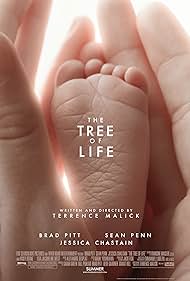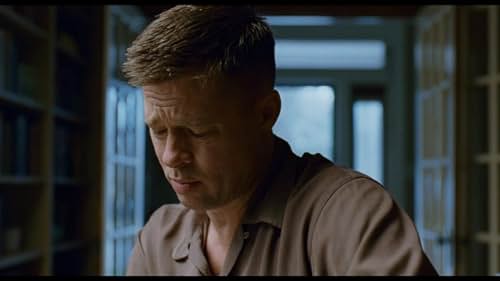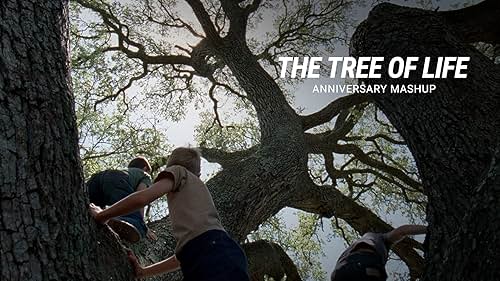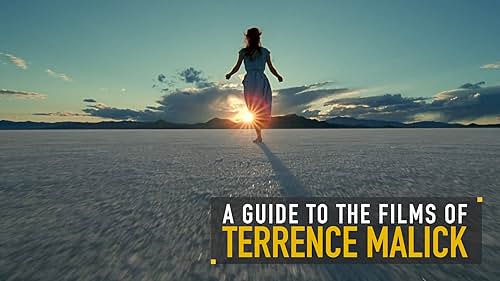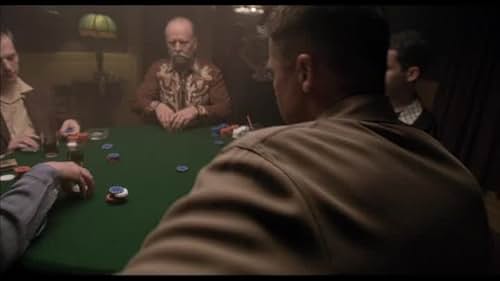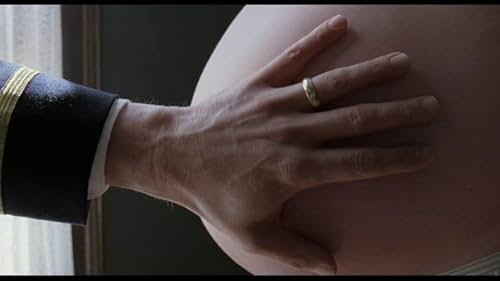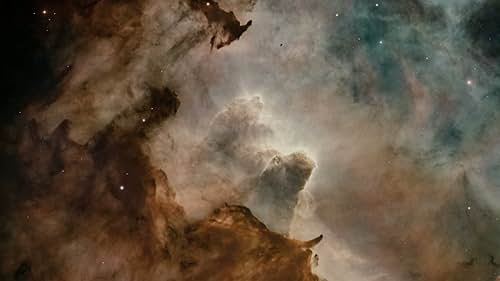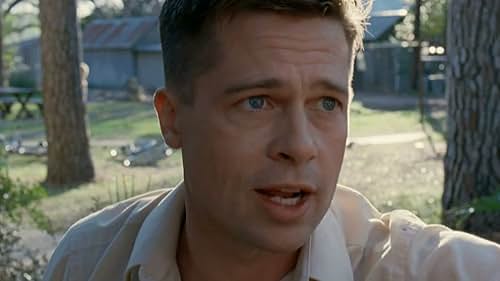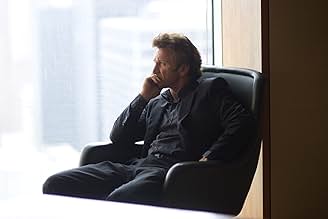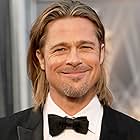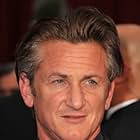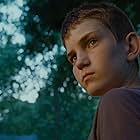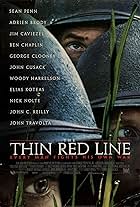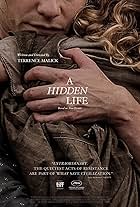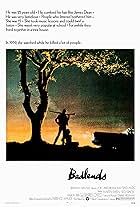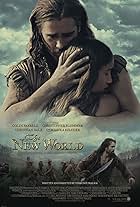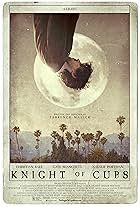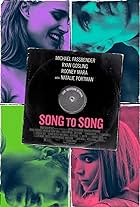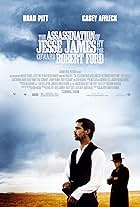The story of a family in Waco, Texas in 1956. The eldest son witnesses the loss of innocence and struggles with his parents' conflicting teachings.The story of a family in Waco, Texas in 1956. The eldest son witnesses the loss of innocence and struggles with his parents' conflicting teachings.The story of a family in Waco, Texas in 1956. The eldest son witnesses the loss of innocence and struggles with his parents' conflicting teachings.
- Nominated for 3 Oscars
- 116 wins & 129 nominations total
- Director
- Writer
- All cast & crew
- Production, box office & more at IMDbPro
Jessica Chastain Through the Years
Jessica Chastain Through the Years
Take a look back at Jessica Chastain's movie career in photos.
Storyline
Did you know
- TriviaDissatisfied by the look of modern computer generated visual effects, director Terrence Malick approached veteran special effects supervisor Douglas Trumbull, who was responsible for the visual effects in 2001: A Space Odyssey (1968), to create the visual effects for the film using bygone optical and practical methods. This marks the first feature film Trumbull has provided the effects for in 29 years, his last being Blade Runner (1982).
- GoofsWhen Mr. O'Brien receives the terrible news at the beginning of the movie by phone, the camera and camera operator are reflected in the handset.
- Quotes
Mrs. O'Brien: [voice over] Help each other. Love everyone. Every leaf. Every ray of light. Forgive.
- Crazy creditsThere are no opening credits.
- Alternate versionsThe Extended Cut of the film was released on Blu-ray and DVD in 2018 for the film's Criterion Collection release. Edited by Terrence Malick and A.J. Edwards, it features roughly 50 minutes of additional footage. This footage includes new music composed by Hanan Townshend and sound design by Joel Dougherty. In the Extended Cut,
- After Mrs. O'Brien (Jessica Chastain) has informed Mr. O'Brien (Brad Pitt) of R.L.'s death, there are four additional shots; Mrs. O'Brien lying in bed, a mirror and lamp, Mrs. O'Brien closing some drapes, and Mrs. O'Brien hugging R.L. (Laramie Eppler) (00:19).
- After Mrs. O'Brien goes into R.L.'s bedroom, there is an additional scene where a neighbor's son brings some food to the O'Brien house (00:08).
- As adult Jack (Sean Penn) arrives at work, there are two additional shots of people moving through the lobby (00:05).
- After he gets out of the elevator, there is an additional shot of Jack greeting a colleague in the lobby (00:07).
- After Jack apologies to his father on the phone, there is a scene where he attends a masked ball in the office (00:11).
- After Jack is shown walking through a barren, rocky landscape, there is a montage of additional scenes; a scene on a pier as he watches people playing in the ocean below, a scene in an arboretum where he examines a flower, a scene in a zoo, a scene in a natural history museum, and a scene in a gallery. At the zoo, museum, and gallery, Jack is accompanied by a woman (Pell James), who, it is strongly implied, is his mistress. After the gallery, there is a scene in Jack's office, where he and the woman are being playful with one another. There is then a shot of another woman (Lisa Marie Newmyer) on his office balcony, followed by a shot of an underwater plant, and a scene where Jack shakes the hand of a homeless man (Wayne Dehart). Multiple shots of the city at night-time follow, showing the industrial sector and people in bars, on the streets, and in nightclubs. A shot of a baby swimming is then followed by several black and white shots of a train. Jack is then shown walking through some ruins, waking up to find his office full of smoke, being attacked by a large thug (Dalip Singh), being hassled on the street by gang members, and lying on the road after crashing his motorbike. This is followed by a montage of shots of and inside Jack's building, then a scene of Jack panicking as he looks out the window of a plane. The sequence ends with some shots of Jack walking through the lobby, followed by several shots of the tree in the courtyard that was shown being planted earlier in the film, and finally, a board meeting in which Jack is told the company is barely breaking even (04:00).
- The 'birth montage' features four additional shots; the shadow of a gate opening, a shot of some birds in the sky, a shot of a peacock, and a shot of water running (00:06).
- After Mrs. O'Brien wakes the children with ice cubes, there is an additional scene where Jack (Hunter McCracken), R.L. and Steve (Tye Sheridan) are looking at two chicks that have fallen from their nest during high winds. As the chicks reach up in an attempt to get food, Mrs. O'Brien hugs Steve and says, "I'll explain to you" (00:41).
- During the scene where the O'Brien family encounter the prisoners being transferred, there is an additional shot of the exterior of the prison, with some of the inmates reaching out through the bars (00:04).
- The scene where Mr. O'Brien and the children visit the barbecue runs slightly longer, and transitions into an additional sequence of several scenes. R.L. is shown playing with a chair by lassoing it. When Mrs. O'Brien picks the chair up, R.L. asks if he can lasso her. She says yes and sits down, and R.L. tosses the rope around her as she laughs. They then discuss lassoing techniques. This scene is followed by a scene of R.L. and Mrs. O'Brien hanging out washing as they playfully interact. Over this scene, we hear Mr. O'Brien telling R.L., "You're going to have a record, and it's going to follow you around for the rest of your life. You mess up, you might not be able to get a security clearance. People will ask why. They'll point the finger at me. All but you. My son." This is followed by a scene in which Jack is weeding the garden. When he returns to the house, Mr. O'Brien asks if he got it all. There is then a dialogue-less scene of Jack and Mrs. O'Brien sitting on the porch (02:44).
- After the scene where Mr. O'Brien is trying to teach Jack and R.L. how to fight, he approaches Steve and jokingly says, "you ready?" (00:07).
- Immediately after the above scene, the dinner scene is longer, and shows Mr. O'Brien drinking from a bottle of Tabasco sauce before he sends Steve away from the table (00:18).
- After the scene where Mr. O'Brien talks to Jack about the navy not granting him leave when Jack was born, there is an additional sequence focusing on Mr. O'Brien's father (Brían F. O'Byrne). We see him working as a welder, trying to sell insurance as a door is slammed in his face, and sitting on a couch. This is followed by a shot of Mr. O'Brien looking at Steve as he plays on the porch. Next, there is a shot of Mr. O'Brien's father as an old man. We then see Mr. O'Brien's mother interacting with R.L. and Steve together, and then Mr. O'Brien alone. This is followed by more shots of his father working as a welder, then a shot of a dying bee, then a shot of him unshaven and worried. Next, there is a shot of Mr. O'Brien staring into space, then a sequence showing him preparing to shave and getting dressed for work. These scenes are accompanied by a voiceover in which Mr. O'Brien says, "I took my father for granted. A sweet man. I thought he was weak. A welder. Machinist. He did what he could. Real estate. Insurance. He worked 12 hours a day, six days a week. Forty years he served them. You know what he got for it? A wristwatch. Somebody ran him over and left him in the street. Left him in the street to die. For years, I had one pair of pants. Same green pants. Had to run around in my shorts while my mother washed them. You have no idea what it's like working for a man you don't respect. It makes you less than a man" (02:08).
- After the scene in school when Jack interacts with Samantha (Samantha Martinez), there is an additional scene in church. Fr. Haynes (Kelly Koonce) asks Jack who gave him his name, and Jack talks about his baptism, entering the family of God, and inheriting the kingdom of heaven. When Haynes asks him what his duty to his neighbor is, Jack answers that it is to love them as he loves himself (00:37).
- Immediately after the above addition, there is a scene of Jack remembering a three-legged dog playing with them. This is followed by a scene of Jack, R.L., and Steve playing around at the river; looking at an airplane flying overhead, trying to throw one another into the water, and flinging mud at one another. This sequence is followed by a scene of Jack watching as Samantha and another boy emerge from behind a shed (01:18).
- After the funeral for the boy who drowned, there are two additional shots; Jack in the kitchen as Steve says to him, "It's kind of embarrassing" and Mrs. O'Brien walking past a snake at the base of a tree (00:14).
- Immediately after the above addition, the scene where Steve asks Mrs. O'Brien "will you die too?" is extended. In the Theatrical Cut, we hear the question, and then immediately cut away, with R.L. saying "you're not that old yet mom" off-camera. In the Extended Cut, however, we see R.L.'s saying "you're not that old yet mom." There are then three quick additional shots; Mrs. O'Brien on the porch, Jack in the garden, the shadow of a swing (00:17).
- Immediately after the above scene, there is an additional scene of Mrs. O'Brien catching her hand in an electric mixer and Jack unplugging it and helping her to clean her hand. This is followed by a brief shot of Mrs. O'Brien floating underwater (00:19).
- The scene where Mr. O'Brien criticizes Jack's upkeep of the lawn is longer, with more questions and critiques (00:18).
- After the fight at dinner, there is an additional shot of Mrs. O'Brien standing contemplatively on the porch (00:24).
- Shortly after the fight at dinner, in the theatrical cut, Mr. O'Brien leaves to go on a trip. In the Extended Cut, however, prior to him leaving, there are several additional sequences. Jack and R.L. are working in the yard, and Mr. O'Brien asks R.L. if he practiced his guitar. This is followed by a shot of Jack rubbing their dog's tummy and then crawling around the yard on his hands and knees in the rain pulling up weeds. Mrs. O'Brien comes out and asks him what he's doing. The film then cuts to Mrs. O'Brien's mother (Fiona Shaw) sitting at the kitchen table with Mrs. O'Brien criticizing Mr. O'Brien ("he's pitiless. Like all weak spirits, he's just full of criticisms and contrariness. He refuses to see who he really is. He's two people, you know. He just wants to be very, very kind, one half of himself, and the other half is mean as a miser. He wouldn't give you an egg. He's jealous of the boys"). She is then shown walking on the street with Mrs. O'Brien pointing out that relationships often fall apart when people have children and the passion fades. Speaking of having too many children herself, she says, "your brothers never really got off to any kind of start at all." Mrs. O'Brien's brother Ray (Jackson Hurst) is then shown visiting the O'Brien's. Popular with the boys, who he is shown playing with, Ray listens as Mrs. O'Brien talks about her husband ("he hasn't filed a tax return in three years"; "works the men under him too hard. Nobody likes him"; "he's a good provider though"). She talks about possibly getting a job herself, but says he doesn't want her to. They discuss her childhood love of science, and she talks about a time when she thought she'd never marry, that no-one would ever love her. She also talks about how important her children are to her ("when those boys were born, my life began"). Jack is then shown asking Mrs. O'Brien if she is going to leave them, and Mr. O'Brien is shown jealously watching Ray play with the children. There are multiple sequences of Ray and the children playing, inter-cut with Mr. O'Brien walking aimlessly around the house and yard. Ray then confronts Mr. O'Brien about the children, telling him, "you force them to love you whether they like it or not." Mr. O'Brien retaliates by accusing Ray of being irresponsible and lazy. Ray then leaves and Mrs. O'Brien wordlessly confronts Mr. O'Brien. A tension-filled meal follows, showing Mr. O'Brien trying to cheer up Steve by telling a joke, but it doesn't work. The sequence ends with a scene of Jack giving Mrs. O'Brien his jar of savings, but she refuses to take it, then a scene of the boys playing (09:47).
- After the montage showing Mrs. O'Brien and the boys playing after Mr. O'Brien leaves on his trip, there are several additional sequences. Jack's friend George Walsh (Dustin Allen) brings Jack into his house, which is messy and strange, with curtains drawn and furniture covered in cloth. As the boys start to throw things around, Mrs. Walsh (Robin Read) is shown aimlessly wandering through the house in a dressing gown, ignoring what they're doing. Jack and George are then shown playing with a knife. Jack asks where George's father is and the film cuts to George walking through an overgrown garden and then being thrown into a greenhouse. His father (Ben Chaplin) then begins to aggressively mock him, comparing the size of their arms, and ranting about the world being a frog pond. He then accuses George of not giving the dog water and places a hammer under his chin, asking "what stops your hands from turning into fins?" This scene is followed by Jack running home and hugging Mrs. O'Brien, as Mr. Walsh locks George in the basement (03:03).
- Immediately after the above sequence, there is another additional sequence. Jack is shown playing with some rocks on his bed and Mrs. O'Brien is in the kitchen when the wind suddenly starts to blow. As dogs bark, it gets louder and wilder, causing concern for everyone in the house. As it continues to get stronger, Mrs. O'Brien and the children are shown trying to get windows and doors shut as people are shown running outside. It then starts to rain, and a power cable falls into the street, still live. The O'Brien's are shown listening to a weather report on the radio as the lights go out. This is followed by several shots of a massive hurricane moving across the land and the O'Brien's sheltering in their basement with a candle. Jack then wakes up to find the street and garden full of debris and broken trees. The O'Briens join the rest of the neighborhood in the clean-up job, as an elderly man talks about the storm; "downtown's gone. 114 dead." Various shots show the O'Brien children trying to get a bicycle out of a tree, looking at an uprooted tree, finding (and playing with) a large fish in a garden, and Mrs. O'Brien cleaning the porch and tidying the house (05:30).
- The sequence of Jack, R.L., and Steve getting up to mischief with their friends is longer. Led by Robert (Bryce Boudoin), we see them roughhousing, tormenting a snail by putting rocks in front of it, chasing girls with a frog, knocking a nest from a roof, taking equipment from a shed and destroying it (when Steve points out it isn't theirs, he's told, "if you don't take something, you're not going to get it"), trying to feed the O'Briens' dog a tortoise and instead giving it to a neighbored dog, and stealing from a vegetable patch in a garden and then destroying the patch (02:40).
- The scene where Jack walks around Mrs. Kimball's house is longer, and shows him looking at a birdcage (00:36).
- Right after Jack says, "what have I started? What have I done?", there is an additional sequence showing him running his hand along the surface of a puddle, playing with R.L., and getting out of a bath. When his mother approaches him in the bathroom, he closes the door in her face (00:14).
- After the scene where Jack tries to roughhouse it with R.L., and R.L. fights back, there is a scene where Jack asks R.L. "you forgive me?" and R.L. says he does. This is followed by a scene where R.L. is playing a clarinet, and Jack grabs it and runs off. R.L. isn't happy and tries to get it back, but Jack refuses to hand it over, and eventually R.L. just walks away. Next there is a scene of Jack getting into a fight in school, then a scene in Mr. Reynolds's (Nicolas Gonda) class where Jack is ignoring everything and scribbling on his notebook. This is followed by a scene of Reynolds trying to get to the bottom of why Jack has started doing so bad in school, then a scene of Reynolds explaining to Mrs. O'Brien that Jack wouldn't complete a painting because "he was afraid it might be wrong." Mrs. O'Brien then speaks to the principal (Freddie Joe), who tells her he was caught copying a report on Egypt from the World Book, he regularly disrupts the class, and he can't handle criticism. Speaking of his own father, the principal says that the threat of a smack can do wonders for a disruptive child. This is followed by Mrs. O'Brien and Jack driving home, and Jack lamenting, "I always do stupid things. I want to be little again". The sequence ends with a scene of the three boys playing around the base of a tree (03:59).
- After the scene where Mr. O'Brien returns home, there is a scene showing Jack destroying the Deutschmark that Mr. O'Brien gave him by pushing it into a fan. This is followed by a scene of Mr. O'Brien telling Jack about his reaction to Jack's birth; "I went out and danced on the lawn, shot off my service revolver." He then criticizes Jack's lack of drive, saying "I make sacrifices for you. Honour those sacrifices by what you do." Mr. O'Brien then shows jack the official seal of his own company, which he had to leave after getting "hepatitis from drinking unpasteurized beer in China." He then talks about how he didn't get an education, but Jack will, saying, "I can redeem myself, you're my freedom." This is followed by a sequence of Mr. O'Brien and the boys walking around town, and Mr. O'Brien getting into an argument with a landlord (Bernie Leuders). The film then cuts to the restaurant scene from the Theatrical Cut, but the scene opens with Mr. O'Brien complaining about how long their last meal took, before turning on the charm with the waitress, much to Jack's disdain (03:16).
- Immediately after the restaurant scene, there is a scene where Mr. O'Brien takes the boys swimming in the lake, but there is still palpable tension between him and Jack (00:34).
- Prior to the scene of Jack walking with the tin cans tied to his feet, there is an additional scene showing Mrs. O'Brien speaking on the phone. Mr. and Mrs. O'Brien then sit Jack down, saying it's important to them that he get the best education possible, so they've decided to send him to boarding school. They promise they'll still see him on weekends and vacations, but Jack gets up and storms out. There is then a scene where a melancholy Mrs. O'Brien points out that Jack isn't getting along with his father or his classmates, so going away is the best option. The sequence ends with some shots of Mrs. O'Brien cleaning (02:03).
- After the O'Briens are shown leaving their house, there is a sequence of Jack in boarding school. He is shown in the library, in a science class room, looking at maps, interacting with other students, smiling as he watches the sun, making friends, striking up a rapport with a girl, playing sports. Mrs. O'Brien's voiceover "The only way to be happy is to love. Unless you love, your life will flash by. Do good to them. Wonder. Hope.", which occurs over the montage of the family moving house in the Theatrical Cut, happens here in the Extended Cut (01:35).
- Immediately after the above addition, there is a scene of Mr. and Mrs. O'Brien on the lakeside, holding onto one another (00:24).
- In the final montage, right before the shot of the two mummified bodies, there are two additional shots; one of adult Jack walking around a derelict building, and one of a young girl walking in the desert (00:11).
- Later in the sequence, after Jack is shown entering a heavy wooden door, there are two additional shots; a group of people walking from the darkness of a barn to the light outside, and a woman taking the hand of a child (00:05).
- The scene on the beach has multiple new shots; Jack is shown kissing the feet of the woman who walks towards him, and there are several shots of some of the people from Jack's past, including his childhood friends, Mrs. Walsh, the angry prisoner (00:14).
- The shots of adult Jack and his father walking on the beach have been reversed - in the Theatrical Cut, they are shown from behind, then in front. In the Extended Cut, we see them from the front, then behind.
- Right before the last shot of the bridge, there is an additional scene of Jack approaching his home, with his wife seen taking her shoes off in the upper window and his son working in the kitchen (00:14).
- At the end of the theatrical credits, there are some additional credits for the people involved in the Extended Cut, including cast members who only appeared in this version (00:42).
- ConnectionsFeatured in Ebert Presents: At the Movies: Episode #1.18 (2011)
- SoundtracksFuneral Canticle
Written by John Tavener and Mother Thekla
Performed by George Mosley, Paul Goodwin and The Academy of Ancient Music
Courtesy of Harmonia Mundi USA
Featured review
How do you watch such a film? You've got to lower any defenses you have. You've got to not allow yourself to try to make a sense out of everything you see. You've got to take it all, and let it enter you, just as smoothly as the film enters dinosaurs, cells, planetary evolution, or a simple living room of a troubled family. Make no judgements, consider nothing except the pure experience of being there, wherever the film takes you. Search no explanation, for there was no real rational reason other than intuition for images to be as they are.
Imagine a film about everything, with a remote storyline that talks about every theme, in every possible time of the world.
Imagine a film without a beginning or an ending. Circular meta-narratives, where you can pick up on any spot (i mean any) and you can create whatever inner narrative you want. A sky of images (like the mosaic poster of the film) where you can pick your own choices, and create whatever story you like. Or you can choose to frame the more palpable story visible in the film in whatever fashion you want. Up to you. The challenge is that you have to test the limits of your own imagination to live the film in its full extent. Nothing is predefined. Go wherever you want.
Now imagine all that delivered by someone who spent his entire film life trying to walk around the idea of plain old narrative layering. The absolute master of unrelated narratives, of off-screen details. The man who films hands and corn fields when he wants to say love; Who shoots the universe to build one of the most powerful expressions of intimacy, of mind's solitude in the film world. Contrast.
I don't know if this is the best film ever made. It probably is the strongest experience in film world that i got first hand, while it was coming out, new.
What is it? a film inside Sean Penn's head? a Story framed in the universe? part of it? metaphor for it?
I've heard a lot about how this film is a kind of 2001. I don't think so. Kubrick and Malick are 2 different kinds, 2 different approaches, purposes, different process, and different outcomes. Kubrick bends narratives to a point of perfection. Obsessive. Chess leaked all over filmmaking. Malick is the other end of the stick. Pure visual intuition, enhanced by Malick's intellectual background. Just because both directors are little fond of public appearances, and because both this and 2001 feature planets, that doesn't bring the films closer.
In 1963, Cortázar published one of the most important books of the last century, Hopscotch. The title of this comment is related to its original title, in Spanish. I think this film and that book have similar aspirations. Trace your path, you have the chapters, but you have to make an order out of them.
How this is done is in pure mastery of every tool of film conception. Every image counts, each shot was taken care with competence and passion, each frame, each camera move - Lubezki has worked with Malick, Iñarritu, Cuarón. Each collaboration adds a lot to what is being done. He really can read the director's aspirations, and deliver nothing short of mastery. At this time he has entered enough important projects to be considered one of the best cinematographers ever.The editing is world class. Every cut, whether the space virtual shots or the family scenes, matter to the narrative, whatever that is. What takes this to a whole new level is how, in this film, Malick tops his already incredible leverage of music. Editing has always equally present the visual as well as the sound scapes. Watch it, let it get absorbed.
This film demands an incredible lot from you, as viewer. It demands that you be a different person after watching you, that indeed you may change your generic approach to film- watching, or at least that you accommodate in you a new way to watch films. On a basic level it's about Malick's intuitions. On another level, it's about what you get on screen. But ultimately it's all about how you place yourself in the universe proposed.
My opinion: 5/5
http://www.7eyes.wordpress.com
Imagine a film about everything, with a remote storyline that talks about every theme, in every possible time of the world.
Imagine a film without a beginning or an ending. Circular meta-narratives, where you can pick up on any spot (i mean any) and you can create whatever inner narrative you want. A sky of images (like the mosaic poster of the film) where you can pick your own choices, and create whatever story you like. Or you can choose to frame the more palpable story visible in the film in whatever fashion you want. Up to you. The challenge is that you have to test the limits of your own imagination to live the film in its full extent. Nothing is predefined. Go wherever you want.
Now imagine all that delivered by someone who spent his entire film life trying to walk around the idea of plain old narrative layering. The absolute master of unrelated narratives, of off-screen details. The man who films hands and corn fields when he wants to say love; Who shoots the universe to build one of the most powerful expressions of intimacy, of mind's solitude in the film world. Contrast.
I don't know if this is the best film ever made. It probably is the strongest experience in film world that i got first hand, while it was coming out, new.
What is it? a film inside Sean Penn's head? a Story framed in the universe? part of it? metaphor for it?
I've heard a lot about how this film is a kind of 2001. I don't think so. Kubrick and Malick are 2 different kinds, 2 different approaches, purposes, different process, and different outcomes. Kubrick bends narratives to a point of perfection. Obsessive. Chess leaked all over filmmaking. Malick is the other end of the stick. Pure visual intuition, enhanced by Malick's intellectual background. Just because both directors are little fond of public appearances, and because both this and 2001 feature planets, that doesn't bring the films closer.
In 1963, Cortázar published one of the most important books of the last century, Hopscotch. The title of this comment is related to its original title, in Spanish. I think this film and that book have similar aspirations. Trace your path, you have the chapters, but you have to make an order out of them.
How this is done is in pure mastery of every tool of film conception. Every image counts, each shot was taken care with competence and passion, each frame, each camera move - Lubezki has worked with Malick, Iñarritu, Cuarón. Each collaboration adds a lot to what is being done. He really can read the director's aspirations, and deliver nothing short of mastery. At this time he has entered enough important projects to be considered one of the best cinematographers ever.The editing is world class. Every cut, whether the space virtual shots or the family scenes, matter to the narrative, whatever that is. What takes this to a whole new level is how, in this film, Malick tops his already incredible leverage of music. Editing has always equally present the visual as well as the sound scapes. Watch it, let it get absorbed.
This film demands an incredible lot from you, as viewer. It demands that you be a different person after watching you, that indeed you may change your generic approach to film- watching, or at least that you accommodate in you a new way to watch films. On a basic level it's about Malick's intuitions. On another level, it's about what you get on screen. But ultimately it's all about how you place yourself in the universe proposed.
My opinion: 5/5
http://www.7eyes.wordpress.com
Details
- Release date
- Country of origin
- Official sites
- Language
- Also known as
- El árbol de la vida
- Filming locations
- Production companies
- See more company credits at IMDbPro
Box office
- Budget
- $32,000,000 (estimated)
- Gross US & Canada
- $13,303,319
- Opening weekend US & Canada
- $372,920
- May 29, 2011
- Gross worldwide
- $58,386,787
- Runtime2 hours 19 minutes
- Color
- Sound mix
- Aspect ratio
- 1.85 : 1
Contribute to this page
Suggest an edit or add missing content

